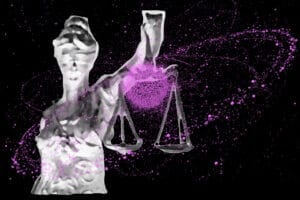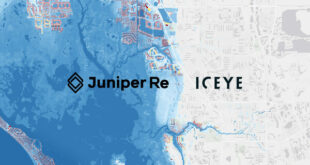by Valentin Eder

The actual discourse and the call for regulations (or management) of space traffic seems to miss something fundamental which is the understanding of the ‘Rule of Law’ and the overview in the ‘causal chain’.
The rule of law:
Following the ‘Rule of Raw’ / ‘Theory of Justice’ by John Rawls:
‘Laws and rules should enable or prevent situations by regulating behaviour’
The current situation in the STM discourse shows a fundamental lack of definitions what situations we want to enable and prevent. And this approach is fully understandable as the political decision-makers and the ‘space industry’ are doing everything to steer clear on these definitions. These definitions would start a possible public discourse about goals, benefits, winners and losers. And this again would bring the stakeholders into the situation to declare themself on their interests. This would “unmask” strategies, contributions and responsibilities in the actual race to space. Nevertheless, it is definitely to be discussed which situations we are talking about and how to enable or prevent these.
The chain of consequences or the ‘situations’:
My perception of the actual worldwide LTS and STM discourse shows two ‘worlds’. The world of space and the world on Earth. And usually, they are not discussed together which leads to space law discussions without taking the socio-economic impact of space services into consideration. Bringing it to the point: a mid- or long-duration outage of (all) space services would change our world economy and our way of living in a more than significant way – an impact that would last for several generations. The economical hang-over of a power black-out of maybe two weeks in Europe would last for a while but would not change our way of living. The outage of space services would definitely do so, and would do it worldwide. Logistic chains would be broken, the way of transporting any goods (oil, container) in the open sea with big ships would stop, the weather forecast would worsen which has an impact on generating renewable energy which again leads to power black-outs – just to mention a small subset of major consequences. The logical consequence is to declare the outage of space services as a likely disaster. This is already enough to have one definition of a situation according to the ‘rule of law’ that should be prevented or enabled.
The UN Spider Sendai Framework is THE framework to manage the disaster in a holistic way. Starting from the Risk Scenarios (priority 1), the Risk/Disaster Governance (prio 2), the Risk Mitigation (prio 3) to the Disaster Preparedness (prio 4) all parts of Risk and Disaster Management are covered. The Sendai Framework is THE appropriate top framework for all activities in and for space with their governing rules. This includes also the implementation of the ‘responsibility of the actors and their ‘behaviour’ as well as the responsibility of, but not limited to, national states to increase resilience in the dependency of space services.
Summarising the rule of law in the context of the actual STM: Neither the situations to be enabled or prevented are discussed nor the behaviour consequences for the stakeholders have a definition. Going on further in this uncoordinated ‘doing something’ we will end in the situation that we missed to be prepared for the outages of space services, the crash of the socio-economic welfare will hit us all unprepared and we find us back in the 70ies.
If we all call for regulations we should call for the following:
- Establish a wide and deep awareness of the dependencies of space services on all levels of the socio-economic community. This should be done in assessments on a national level
- Define the risk and disaster scenarios on a national level
- Define and implement the governance of risk and disaster management including the mitigation strategies (what is more or less written in the UNOOSA LTS guidelines) on a national, transnational and international level
- Strengthen the national disaster preparedness by
- monitoring (single and system risks)
- building rescue backup plans and resources
- training of the disaster events
- work on ‘build back better’ plans
Our assessment of the actual implementation of the above-listed points is that in the EU only the following activities are implemented
- the monitoring single Space Object risks are handled by EUSST (collisions, de-fragmentations and re-entry)
- big plans of Planetary Defence (avoidance of impact of an Asteroid on Earth)
- local activities and big plans of Space Weather monitoring.
There is still a lot to do to reach the appropriate level of managing space activities. With this article, I hope to contribute in the change of the mindset of all acting stakeholders in and for space activities.
One point at the end:
A chain collision in space will definitely change our way of living.
Maybe this, on the first dystopic picture, also has an utopian part included.
We are all sitting in the same boat and with us all our children and their children. There is no way to escape. It is time to agree on the boat’s course – and we should get life vests for all of us.

Space Analyses (Vienna, Austria), founded in 2014 by Valentin Eder, digs into the convergence of Big Data with the Space-Time Continuum and applies the results to domains such as Satellite Communication and Space Debris Management. Space Analyses develops holistic data analytics solutions for Satellite Payload and Spacecraft Operations. With its comparably unique combination of Earth Observation, RF monitoring, Satellite Operations and SW Development know-how Space Analyses is a valued partner of Satellite and Satellite Network Operators.
Valentin Eder has a background in industrial engineering, high voltage power grid management, spectrum monitoring, robotics, software (Data management and Big Data applications), system engineering and space environment management. He holds a degree or the University Salzburg in Geographical Information Systems. He acts as founder and CEO of Space Analyses Vienna acting in a holistic convergence of Big Data with the Space-Time Continuum and applies the results to domains such as Satellite Communication and Space Debris Management.





